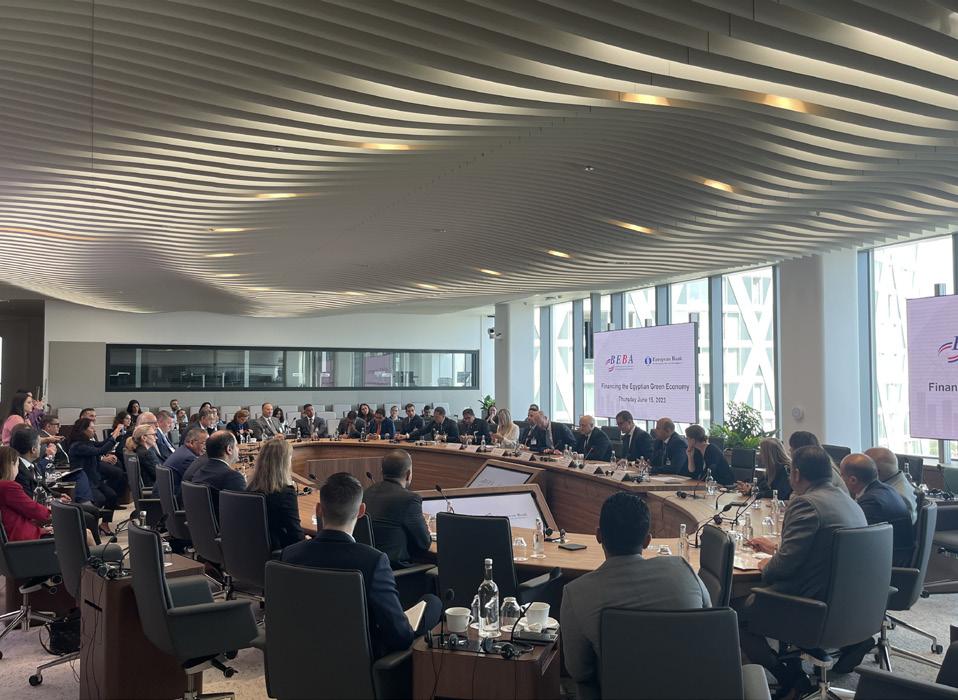
3 minute read
Financing the Egyptian
In partnership with European Bank for Reconstruction and Development EBRD, a session entitled “Financing the Egyptian Green Economy” was held on the second day of the sectoral mission, where some welcome remarks were introduced by Harry Boyd-Carpenter, Managing Director, Climate Strategy & Delivery European Bank for Reconstruction & Development (EBRD); Maged Ezzeldeen, Country Senior Partner & Deals Leader at PWC and BEBA’s board member; and HE Sherif Kamel, Egypt’s Ambassador to the UK.
The session also featured an opening video statement from Minister of Finance Mohamed Maait, who affirmed that Britain is a major strategic partner for Egypt and a leading foreign investor in the Egyptian market. The Minister further elaborated that the current global challenges have severely affected sustainable development globally, adding that joint global efforts are needed to overcome such challenges. With developing countries bearing huge burdens as a result of the repercussions of the ongoing global economic crisis and the “imported inflation” ravaging the country’s financial capabilities, the Minister highlighted that support is crucial to help emerging economies grow green. The Minister highlighted that investing in green projects provides new and promising opportunities, adding that Egypt working on offering several incentive packages to encourage environmentally sustainable projects and behind the country’s commitment to continue its economic reform process via increasing the private sector’s contributions to environmentally friendly investments, so that it becomes the main engine of growth in line with “Egypt’s National Strategy for Climate Change 2050”.
The Minister’s statement was followed by a panel session, where the discussion was led by Rami Aboul Naga, Deputy Governor, Central Bank of Egypt; Sherif Hamouda, Chairman, GV Investment Group Egypt; Hisham Ezz Al-Arab, Chairman, CIB; Heike Harmgart, EBRD Managing Director, Southern & Eastern Mediterranean; Maya Hennerkes, EBRD Director, Green Financial Systems, CSD – Green Financial Systems; and Theresa Löber, Head of Climate Hub at Bank of England. Moderated by Director of EBRD’s Climate Strategy & Regional Delivery Dimitri G., the discussion delved into the role of the government and the private sector in mobilizing funds to achieve the country’s sustainable development goals and leveraging public-private partnerships and innovative financing mechanisms to mobilize funds for green investments.
During the panel session, EBRD Managing Director Heike Harmgart lauded the NWFE program which aims to promote eco-friendly projects in line with Egypt’s National Climate Change Strategy 2050, and to enhance Egypt’s Vision 2030. Being Egypt’s leading partner on the NWFE, EBRD is set to provide €1.3 billion to finance projects that aid the transition to green and renewable energy in the coming five years. The discussions also highlighted that while Africa is among the most affected regions by climate change, climate financing is still not enough with most of the governments not fulfilling their climate financing pledges. The session also delved into discussing where the climate financing challenges are demand driven or supply driven; accordingly, the panelists highlighted that the problem exists in carbon pricing, the available fiscal space and the evolving exchange rates, besides the difficulty in scaling up projects and de-risking them, the lack of information availability, and the existence of the right risk return.
On another front, the banking sector has been taking serious steps showing its commitment to sustainability, amongst which was CIB’s action towards joining in 2019 the United Nations Environment Program Finance Initiative (UNEP FI) Principles for Responsible Banking, principles targeted specifically for the banking sector to encompass social, environmental, and governance practices as part of their day-to-day operations. Since signing the principles, CIB has taken the lead in Egypt in forming international partnerships that address responsible banking, the empowerment of small businesses, financial literacy, and corporate commitment to climate action, in addition to being the first bank in Egypt to issue a Green Bond with a value of USD 100 million. With climate change causing not only economic but also financial risks through increased default risk of loan portfolios or lower values of assets, it becomes necessary for Central banks and financial regulators to increasingly acknowledge the financial stability implications of climate change and to work together in providing financing and trainings that enhance their abilities on integrating climate-related risks into supervision and financial stability monitoring.





Furthermore, the panel session alluded to ‘Tarboul Industrial City’, which is considered as a model for a green industrial city that relies on the use of solar energy and wind energy to reduce reliance on traditional energy sources besides recycling water, which contributes to reducing harmful emissions to the environment and helps in the optimal investment of natural resources. Chairman of GV Investment Group Sherif Hamouda revealed that the first electrolyzer factory will be announced soon in Tarboul. Finally, the panel session concluded that more efforts are needed to address climate driven challenges and that governments could mobilize funding through publicprivate partnerships (PPPs) and blended financing.




Thursday June 15, 2023










